Effective call handling is crucial for businesses of all sizes and industries. Good call handling directly impacts customer satisfaction, brand reputation, and overall business success. In this blog post, we will explore:
- What is Call Handling
- How Does Call Handling Work
- Essential Call Handling Best Practices
From understanding your unique call handling needs to leveraging technology and incorporating customer feedback, this guide will enable you to provide exceptional service and improve operational efficiency.
What is Call Handling?
Call handling refers to managing incoming and outgoing phone calls professionally and efficiently. It involves various tasks and skills, including answering calls, gathering and providing information, resolving customer inquiries or issues, and transferring calls to the appropriate organizational departments or individuals.
Call handling may involve:
- Following specific scripts
- Utilizing call management software or tools
- Adhering to established protocols to deliver consistent and high-quality customer service over the phone
Improve your business’ call handling with our free workbook!
Get the Call Handling Workbook
How Does Call Handling Work?
#1 Answering the Call
When a call comes in, the first and most crucial step is to answer the phone promptly and professionally. This includes greeting the caller, identifying your business or department, and introducing yourself if necessary.
When answering the call, it is important to greet the caller in a friendly and professional manner. This helps create a positive first impression and sets a welcoming tone for the conversation. The greeting should include the name of your business or department and your name, if appropriate.
For example, a proper greeting might be: “Thank you for calling ABC Company. This is [Your Name]. How may I assist you today?”
#2 Active Listening
Once the call is answered, the call handler must actively listen to the caller’s needs, concerns, or inquiries. This involves paying close attention to the caller’s words, tone, and any specific details they provide.
#3 Gathering Information
Based on the caller’s purpose for calling, the call handler gathers relevant information to address their needs. This may include their name, contact details, account information, or inquiry or issue details.
#4 Providing Assistance
After gathering the necessary information, the call handler assists the caller appropriately. This can include answering their questions, providing information, troubleshooting technical issues, or resolving concerns. The call handler should respond clearly and concisely while maintaining a professional and helpful demeanor.
#5 Problem Solving
When the caller has a complex issue or requires further assistance, the call handler may need to engage in problem-solving. This can involve consulting with supervisors or other departments, accessing additional resources or information, and exploring options to find a resolution for the caller.
#6 Call Transfer or Escalation
If the call handler determines that the caller’s needs are beyond their scope of expertise, they may transfer the call to a more specialized department or escalate it to a supervisor or manager. This ensures the caller is connected to the most appropriate person or resource to address their concerns effectively.
#7 Documentation
Throughout the call-handling process, it is essential to document relevant information, such as the caller’s details, the nature of the call, and any actions taken or promises made. This documentation references future interactions and records the customer’s history.
#8 Closing the Call
Once the caller’s needs have been addressed or the necessary actions have been taken, the call handler concludes the call professionally. This includes summarizing the key points discussed, confirming any follow-up steps or activities, and expressing gratitude for the caller’s time and patience.
#9 Continuous Improvement
Call handling should be an ongoing process of learning and improvement. Call handlers and supervisors can review call recordings, gather customer feedback, and participate in training or coaching sessions to enhance their skills and provide an even better customer experience.
Call Handling Best Practices
Knowing call handling best practices is essential because it directly impacts customer satisfaction and brand reputation. By implementing these practices, businesses can:
- Improve efficiency
- Enhance communication
- Provide consistent, high-quality service
- Increase customer retention and loyalty
- Deliver exceptional customer experiences
- Build a solid brand image
Follow our best practices for call handling to improve your business.
Understanding the Unique Call Handling Needs of Your Business & Customers
Before implementing any call-handling strategies, it’s crucial to understand your business’s specific requirements and your customers’ expectations. Analyze the nature of your business, the types of calls you receive, and the demographics of your customer base. This understanding will guide your approach to call handling and allow you to tailor your processes accordingly.
Creating a Call Handling Script Reflecting Your Brand’s Voice & Values
Developing a call-handling script is essential for consistent and professional customer interactions. Craft a script that aligns with your brand’s voice and values, ensuring that it represents your company accurately. The hand should include greetings, critical information to gather, and responses to common inquiries or concerns. However, it’s essential to strike a balance between a structured script and allowing flexibility for personalized interactions.
Providing Training & Ongoing Coaching
Effective call handling requires well-trained and skilled employees. Invest in comprehensive training programs that cover various aspects such as active listening, problem-solving, and empathetic communication. Additionally, offer ongoing coaching and feedback sessions to reinforce best practices, address performance gaps, and continuously improve call-handling skills across your team.
Implementing a Call Escalation Process
Not all customer inquiries or complaints can be resolved immediately. Establishing a call escalation process to handle more complex issues effectively is a great way to deal with angry callers. Define criteria for when to escalate a call to a supervisor or another department, ensuring a seamless transfer of information and resolution for the customer. Clear communication channels and protocols are essential for efficient call escalations.
Leveraging Technology
Technology plays a crucial role in optimizing call-handling processes. Utilize tools such as call transcription services to ensure accurate note-taking and easy reference for future interactions. Consider implementing chatbots or interactive voice response (IVR) systems to handle simple queries and provide self-service options, freeing up your team’s time for more complex issues. Integrating customer relationship management (CRM), systems can also enhance call handling by providing agents with comprehensive customer information.
Streamline the Process by Outsourcing
Outsourcing call handling to professional answering services like Abby Connect can streamline your operations and provide exceptional customer service. These services offer trained virtual receptionists who can handle calls on your behalf, ensuring that every call is answered promptly and professionally. This outsourcing example allows your team to focus on core business activities while benefiting from expert call handling.
You decide when you answer the phone, when your receptionists take a message, and who you send to voicemail. What happens after the pass-off from your receptionist is up to you!
Establishing Clear Communication Channels Between Call Center Agents & Other Departments
Collaboration between call center agents and other departments is vital for effective call handling. Establish clear communication channels to enable seamless information sharing and issue resolution. Regular meetings or interdepartmental training sessions can foster better understanding and coordination, improving customer service outcomes.
Compliance with Industry Regulations & Data Privacy Laws
Depending on your industry, compliance with specific regulations and data privacy laws is essential. For instance, healthcare providers must adhere to HIPAA regulations when handling patient information. Dental and medical answering services like Abby Connect specialize in maintaining compliance, ensuring sensitive data is held securely and confidentially.
Incorporating Customer Feedback into Call Handling Processes
Customer feedback is a valuable resource for enhancing call-handling practices. Regularly solicit feedback through surveys or follow-up calls to identify areas for improvement. Analyze customer insights and incorporate them into your call-handling processes to address pain points, streamline operations, and deliver an exceptional customer experience.
Elevate Your Call Handling With Abby Connect
Implementing effective call-handling practices is crucial for businesses aiming to deliver exceptional customer service and maximize operational efficiency. By understanding your business’s unique needs, creating a tailored call-handling instructions, providing comprehensive training, leveraging technology, and collaborating with professional business answering services like Abby Connect, you can ensure consistent and exceptional call-handling experiences. Additionally, compliance with industry regulations, incorporating customer feedback, and continuous iteration will help your business stay ahead in a competitive marketplace while delivering outstanding customer experiences. Be sure to check out our call handling workbook so you can start generating leads.

